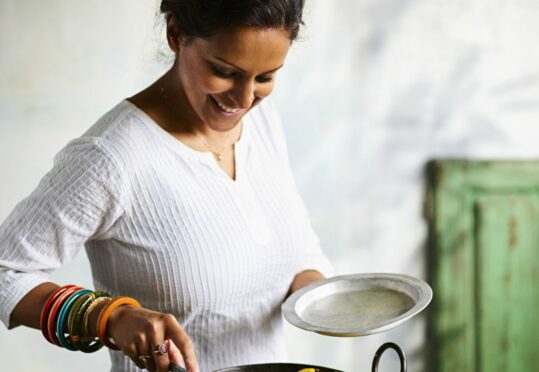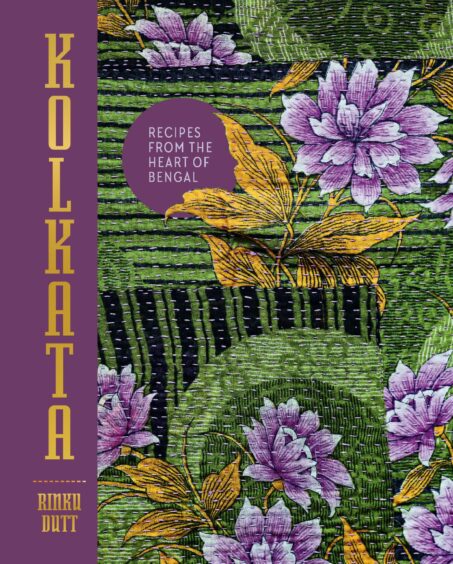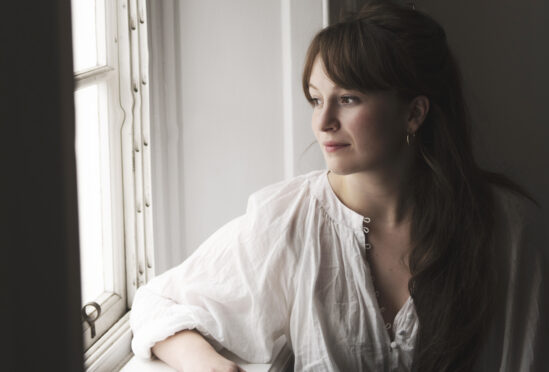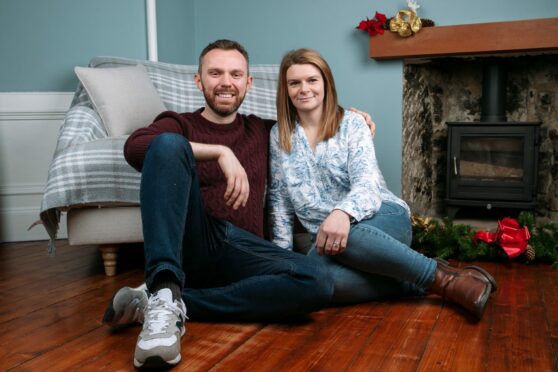
When Rinku Dutt sat down to write her first cookbook, she had generations of family recipes to share, but just one small problem – none of the dishes she knew and loved were written down.
From maacher jhol, a classic Bengali fish curry, to chicken biryani, her dad’s speciality, she had learned from a young age to cook by simply taking a “pinch of this” and a “sprinkle of that” to bring flavours to life.
And while that was all well and good at home, the method perhaps wasn’t practical for a 200-page guide.
“When it came to recipe testing there were lots of emotions flying around in the kitchen, let’s say,” Dutt explained with a laugh. “I would pick up the phone and be like, ‘Mum how you do make this dish?’ and she would reply, ‘Rinku, it’s very easy to make’ and I would get ready to start writing things down. But if it was, for example, a potato dish, she would only say, ‘So you put oil and cumin seeds and potatoes in a frying pan, add some tomatoes, then it’s done!’
“It’s second nature for her to just pick up a pinch of turmeric, a little bit of salt, and bring the dish to life. Measuring ingredients is just a completely different style, and having scales in the kitchen was completely unheard of for both mum and dad.
“They cook with what we call andaz – the measure of the eye. They just know what needs to be put in the pot and every time it comes out great. That’s how their parents did it, too. So, I had to do some very precise watching, testing and re-testing. Now we have a laugh and a joke about it, but when you’re under time pressure, it is definitely a challenge!”
Dutt’s dedicated note taking did, however, pay off and, last month, she published Kolkata: Recipes From The Heart Of Bengal, which brings together her favourite recipes from the cultural capital of India, her family’s homeland.
Covering breakfast, lunch and dinner, as well as snacks, sweets and sides, each of Dutt’s recipes started life in the family kitchen, and later formed the menu of her street food stall, Raastawala, which was founded in 2017 alongside her husband, Neelan, and dad, Ron. With regular customers often asking how they could recreate dishes at home, a cookbook was the natural next step – and the perfect way to share authentic recipes, rather than Westernised curries.
“The perception of Indian food has changed dramatically in the last 15 or 20 years,” explained Dutt, who lives in London. “The perception of Indian food was that it is rich, full of spice, heavy, but as more dishes and cuisines have been introduced, people have started to realise that it isn’t all about the spice.
“For a vegetable dry fry, for example, you have one type of a spice that you temper, salt, a little bit of sugar and then the vegetable is the highlight – the flavours of the fresh produce is what comes out. With a lot of Bengali food from Kolkata, it’s minimal spices, so that perception of it being heavy rich, with lots of butter and ghee, is one of the barriers that’s been broken with our street food. It’s not just curries, it’s rolls and chaats, too, which are sweet, sour and tangy with an the explosion of flavours. I like to say our food takes the whole tastebuds on the journey, without sitting down in a fine dining Indian restaurant.”
With her parents keen to “ensure the connection with our motherland never faded”, Dutt now hopes her collection of recipes will do the same for her daughters, Sureya and Anoushka.
She said: “When my parents came to the UK in the late ’60s, early ’70s, they wanted to keep hold of their community, and food was one of the ways they did that. It was a language, a form of communication for them, and a way of bringing people together.
“My book wouldn’t exist if it wasn’t for my dad’s recipes and family history, and my parents tried very hard to keep as much of their culture alive in us as they could. Now, I want to do the same for my children, the next generation, as well.”
Kolkata: Recipes From The Heart Of Bengal, Smith Street Books, £26, is available now

Enjoy the convenience of having The Sunday Post delivered as a digital ePaper straight to your smartphone, tablet or computer.
Subscribe for only £5.49 a month and enjoy all the benefits of the printed paper as a digital replica.
Subscribe


